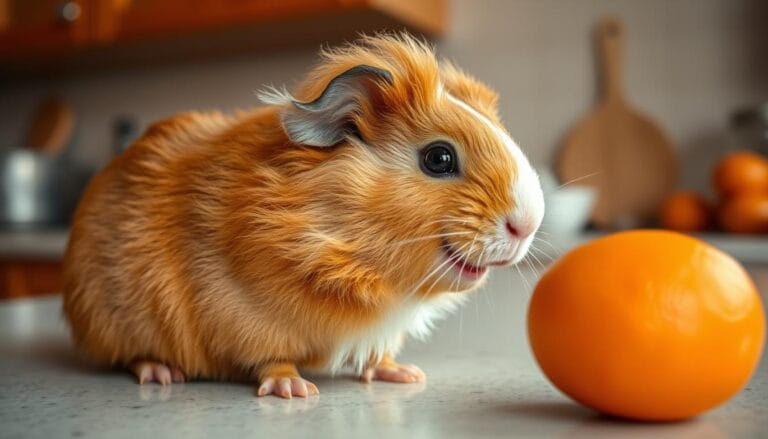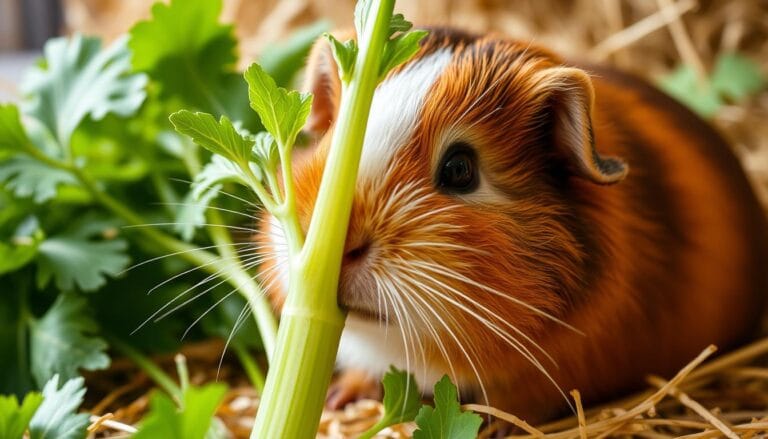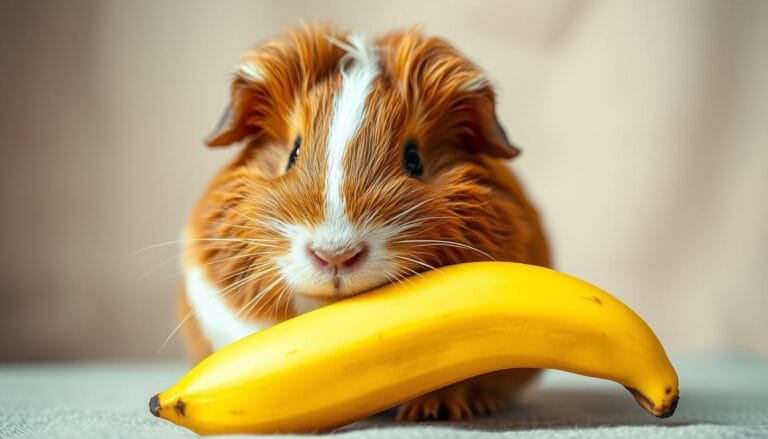Do Guinea Pigs Hibernate? The Surprising Truth Revealed
Did you know guinea pigs don’t hibernate? Many pet owners think they do, but it’s not true. Unlike bears, guinea pigs aren’t made for hibernation. So, do guinea pigs hibernate? No, and it’s important to know why.
Guinea pigs can handle cold temperatures. They can even stay warm in temperatures as low as 50°F (10°C). But they need shelter, food, and water to do so.
Table of Contents
As a guinea pig owner, you must care for them in all seasons. You might wonder if they hibernate. Knowing the truth helps you keep them warm and healthy in winter. They need a good diet all year, but more in cold months when they work harder to stay warm.
Key Takeaways
- Guinea pigs do not hibernate, and they are not adapted for hibernation like some other animals.
- The ideal temperature range for guinea pigs is between 65°F and 75°F (18°C to 24°C).
- Guinea pigs can tolerate temperatures as low as 50°F (10°C) with adequate shelter, food, and water.
- Providing ample hay is essential during colder months for energy and warmth.
- Consistent monitoring of a guinea pig’s eating habits and activity levels is critical, specially during temperature drops.
- Guinea pigs need a nutritious diet year-round, specially more during colder months.
The Truth About Guinea Pig Hibernation
Many people wonder if guinea pigs hibernate. The answer is no, they do not. Guinea pigs come from South America, where it’s always warm. They don’t have the body changes needed for hibernation.
Guinea pig hibernation is often mixed up with torpor, a state of less activity. But true hibernation is different. It involves a big drop in body temperature and other changes. Guinea pigs don’t go through these changes, so they don’t hibernate.
What Science Says About Guinea Pig Sleep Patterns
Studies show guinea pigs are active for about 20 hours a day. They sleep differently than many animals. Their bodies are made to handle various climates.
But, if a guinea pig seems too sleepy, it could be a sign of a problem. Watch for any unusual signs of inactivity.
Natural Survival Mechanisms of Guinea Pigs
Guinea pigs like to hide and seek. This is often thought to be hibernation. But, it’s not. They hide in quiet, dark spots, but it’s not hibernation.
Guinea pigs can live in many places. They just need food, water, and a safe place to stay.
Why Guinea Pigs Don’t Need to Hibernate
Guinea pigs can keep their body temperature steady. They don’t need to hibernate to stay alive. They can handle different temperatures, but they need a stable home.
The best room temperature for them is between 65°F to 73°F. Keep them away from cold drafts and very hot places.
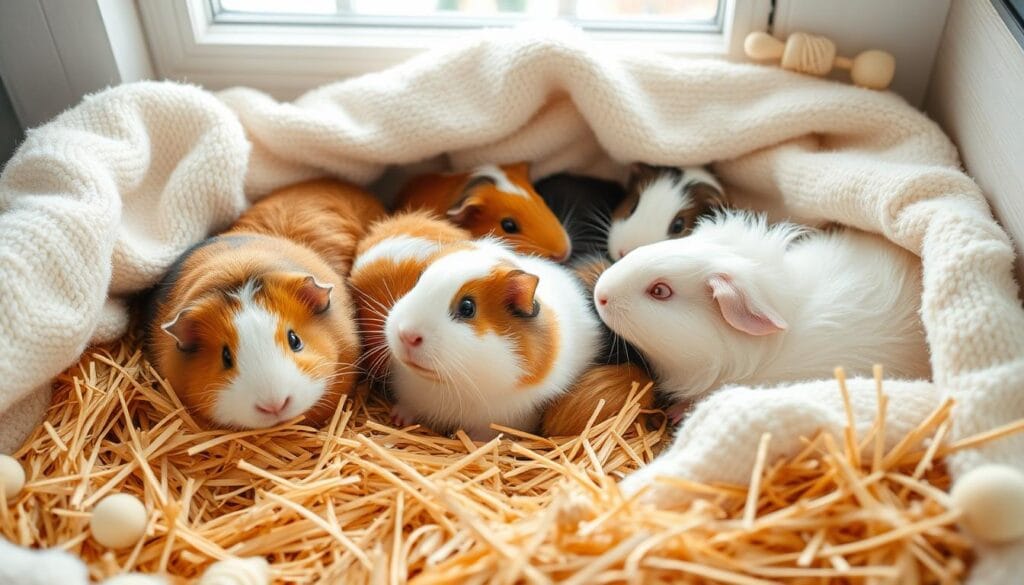
In short, guinea pigs don’t hibernate and don’t need to. By understanding how they survive and keeping their environment stable, you can help them thrive.
Understanding Your Guinea Pig’s Natural Habitat
Learning about do guinea pigs hibernate means knowing their natural home. Guinea pigs are always on the move, active for about 20 hours a day. To keep them cozy, their home should be between 18 and 23 degrees Celsius.
Guinea pigs don’t handle cold or heat well. They don’t hibernate like some animals do. So, it’s key to keep their home warm and stable. Use hay, fleece, and shredded paper to keep them warm when it’s chilly.
Creating a comfy home for your guinea pig involves a few things:
- Keep the temperature between 18 and 23 degrees Celsius.
- Use hay, fleece, and shredded paper for warmth.
- Make sure there’s good air flow to avoid too much moisture.
- Feed them a balanced diet to keep them healthy.
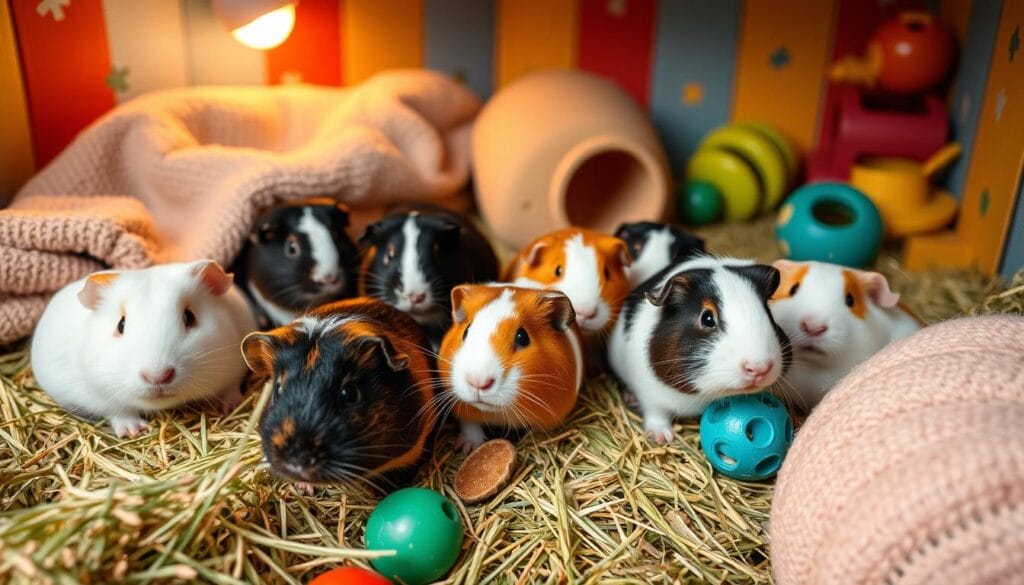
By mimicking their natural habitat, you can make your guinea pig happy and healthy. Remember, they don’t like extreme temperatures. If they seem off, like eating less or moving less, see a vet right away.
How Guinea Pigs Handle Cold Weather
It’s important to know how guinea pigs handle cold weather. They don’t hibernate like some animals, and the question of do guinea pigs hibernate often comes up among pet owners. The simple answer is no—guinea pigs do not hibernate , and their bodies can’t handle extreme cold. They are sensitive to cold and can get sick if exposed to it for too long.
Guinea pigs need shelter, food, and water to stay warm. If it gets below 50 degrees Fahrenheit, they might get stressed. To ensure their comfort, keep their home between 65 to 73 degrees Fahrenheit. If you’re wondering again, do guinea pigs hibernate , remember that they rely on you to provide the right environment instead of relying on natural hibernation processes. Watch for signs of distress if you’re worried about the cold and adjust their living conditions accordingly.
Temperature Tolerance Ranges
Guinea pigs prefer a certain temperature range. They can get sick if it’s too cold or too hot. Keeping the temperature stable is key to their health and happiness.
Signs of Cold Stress in Guinea Pigs
Cold stress can make guinea pigs shiver, breathe hard, and move slowly. If you see these signs, warm them up and make their home cozy. Remember, they don’t truly hibernate, but they might act like it when it’s cold.
Behavioral Changes in Winter
In winter, guinea pigs might sleep more and move less. This is normal, but watch them closely. By understanding their cold weather needs, you can keep them happy and healthy. This way, you avoid myths about guinea pigs hibernating.
Common Misconceptions About Do Guinea Pigs Hibernate
Many people wonder if do guinea pigs hibernate. The truth is, they don’t. This myth likely came from their sensitivity to temperature changes. They might seem less active in cold weather.
Knowing the truth about guinea pig hibernation is key to caring for them. They don’t hibernate, so make sure their home is warm and cozy. This is important, more so in winter.
Signs your guinea pig is too cold include shivering and less appetite. If you see these, warm up their space. Add more bedding or use a heat source.
Understanding that do guinea pigs hibernate is false helps you care for them better. They are sensitive to temperature, so watch their environment closely. Adjust it as needed to keep them happy and healthy.
Keeping Your Guinea Pig Warm in Winter
Guinea pigs don’t truly hibernate , but they can get very cold. The question of whether do guinea pigs hibernate often arises, but the fact is they need help staying warm instead of relying on hibernation. To keep them comfortable, you need a cozy shelter. The best temperature for them is between 17°C to 21°C. Use insulation like bedding and thermal covers to maintain the right temperature.
Here are some ways to keep your guinea pig warm:
- Provide a warm, dry shelter like a cage or hutch with good insulation.
- Use hay or straw bedding to keep them warm and dry.
- Check the temperature in their enclosure to make sure it’s just right.
Guinea pigs can’t handle cold as well as some animals, like rabbits. So, it’s very important to keep them warm in winter. By following these tips, you can make sure your guinea pig stays healthy and happy all year round.
Cleaning their habitat often is key in cold weather. It keeps the bedding dry and clean. This helps prevent a cold, unhealthy place for your guinea pig. By doing this, you can keep them warm and healthy, even when it’s very cold.
Seasonal Care Requirements for Guinea Pigs
Learning about do guinea pigs hibernate is important. You need to know how to care for them in different seasons. In winter, give them extra hay and keep them warm. In summer, protect them from the sun to avoid heatstroke.
Here are some tips for seasonal care:
- Keep your guinea pigs away from drafts and cold temperatures, specially in winter.
- Use bedding and heat mats to keep them comfortable.
- Check the temperature and humidity in their habitat to avoid heatstroke or hypothermia.
Knowing the right temperature for guinea pigs is key. They like daytime temperatures between 65°F to 73°F (18°C to 23°C). Nighttime should be above 60°F (16°C). Remember, do guinea pigs hibernate is a common question. But, the main thing is to keep them safe and comfortable.
By following these tips, you can keep your guinea pigs happy and healthy all year. Always put their comfort and safety first. If you have any health concerns, talk to a vet.
Health Concerns During Cold Months
When it gets cold, it’s important to watch your guinea pigs’ health. They don’t hibernate like some animals, but cold can stress them. Keep an eye on their behavior and look for signs of trouble.
Signs to watch for include shivering, feeling tired, and not wanting to eat. If you see these, make sure they’re warm and cozy. Use hay or wood shavings for bedding. You can also try guinea pigs hibernation prevention methods like cuddle pods or heated spots.
Warning Signs to Watch For
- Shivering or trembling
- Lethargy or lack of energy
- Loss of appetite or decreased water intake
- Changes in breathing or heart rate
When to Contact a Vet
If you see any of these signs or worry about your guinea pig, call a vet. They know how to keep your pets safe and warm in the cold.
Comparing Guinea Pigs to Other Pets
Thinking about getting a new pet? You might compare guinea pigs to chinchillas. People often ask, do chinchillas hibernate? Chinchillas, from the Andes, have thick fur to stay warm. They don’t truly hibernate but can sleep a lot in cold weather.
Guinea pigs, on the other hand, are domesticated and have been around for thousands of years. They are smart and love to be with others. To care for them, you need to give them lots of hay and special pellets. Also, keep their cage clean and spend time with them.
Here are some main differences between guinea pigs and other pets like chinchillas:
- Diet: Guinea pigs need lots of fiber, while chinchillas should eat less fat and more fiber.
- Temperature: Guinea pigs can’t handle very hot or cold, but chinchillas are okay with cold.
- Socialization: Guinea pigs need lots of company, but chinchillas can be alone more often.
Knowing what each pet needs helps you care for them better. Whether it’s a guinea pig or another pet, research their needs well. This way, you can give them the best care and attention.
Conclusion: Understanding Your Guinea Pig’s Year-Round Needs
Guinea pigs don’t hibernate , but they still need your care all year. If you’ve ever asked, Do Guinea Pigs Hibernate? , the answer is no—they do not go into a hibernation state. Knowing their natural habits and what they like helps keep them healthy and happy, even when it’s cold. This is important because many people wonder if Do Guinea Pigs Hibernate? applies to their pets, but the truth is, they depend on us for warmth.
Keeping their home between 65-75°F (18-24°C) is key. Temperatures under 60°F (16°C) can make them feel very cold. Watch for signs like being very tired, huddling, and slow movements. If you see these, make their space warmer—remember, since they don’t hibernate , they rely on their environment to stay comfortable.
Good bedding, keeping them warm, and checking their health often are also important. With the right steps, your guinea pig can be happy all year. They will bring you lots of joy and friendship. Guinea pigs are tough, but they need a safe and cozy home. By knowing what they need, you can make sure they live a happy and healthy life, no matter the season. So, while the question Do Guinea Pigs Hibernate? might come up, the focus should always be on providing the best care possible!
FAQ
Do guinea pigs hibernate?
No, guinea pigs do not hibernate. They stay active all year and don’t need to hibernate to get through winter.
What are the natural survival mechanisms of guinea pigs?
Guinea pigs can handle different climates and environments well. They can keep their body temperature right and use energy efficiently. This means they don’t need to hibernate.
How can I create a comfortable environment for my guinea pig during the winter?
To keep your guinea pig happy and warm in winter, make sure their home is cozy. Use the right bedding and insulation to keep them snug.
What are the signs of cold stress in guinea pigs?
Look out for shivering, being very tired, not wanting to eat, and acting differently. If you see these signs, watch your guinea pig closely and talk to a vet.
How do guinea pigs compare to other pets, such as chinchillas, when it comes to hibernation?
Chinchillas can go into a state like hibernation in cold weather. But, each pet is different. Make sure you know what your pet needs and give them the right care.
There are no reviews yet. Be the first one to write one.



